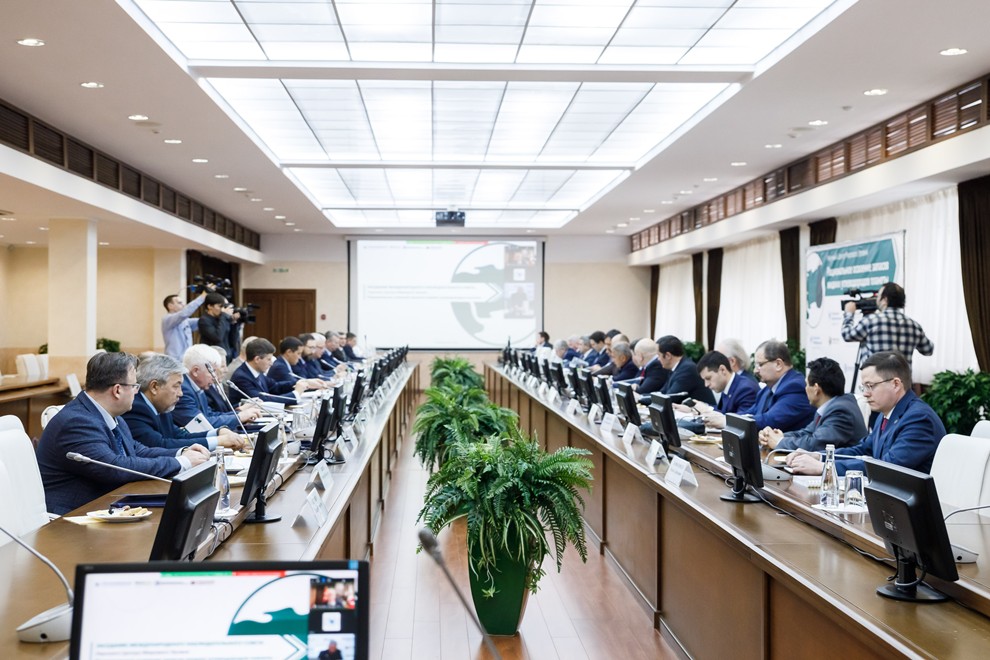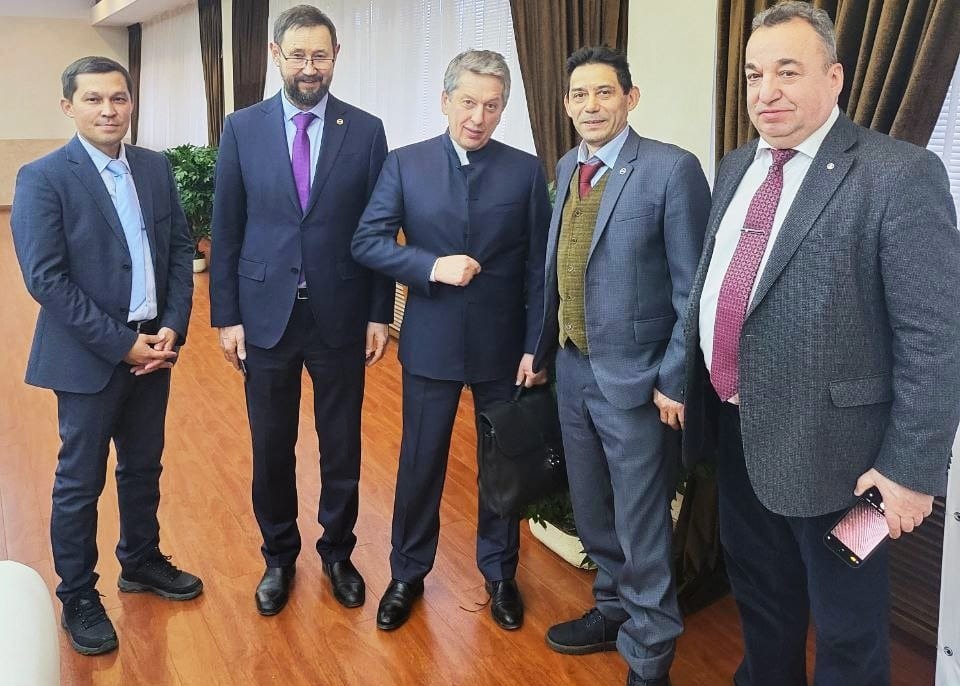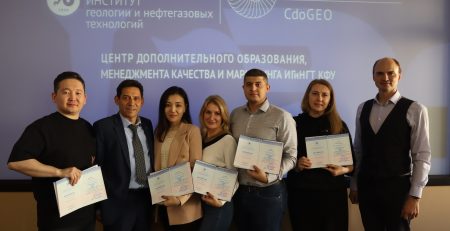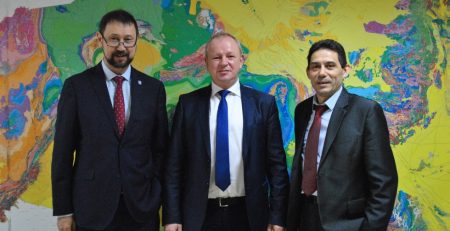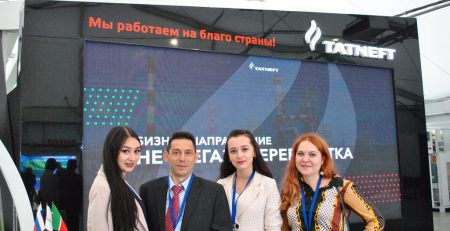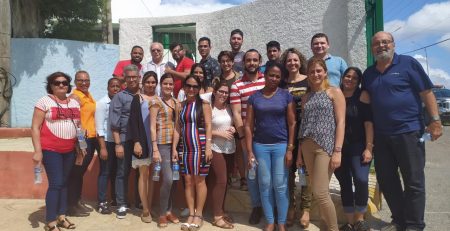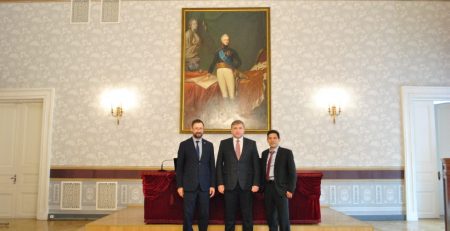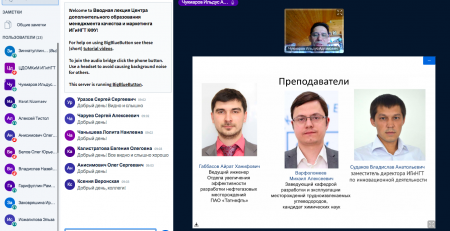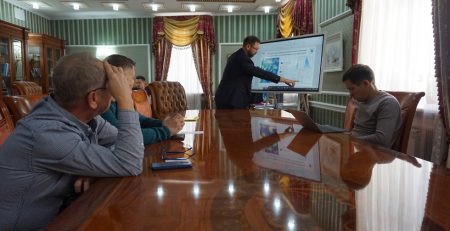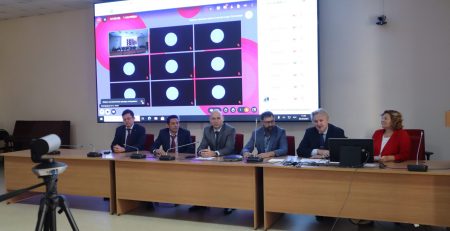A meeting of the Supervisory Board of the World-Class Science Center was held at KFU
Kazan Federal University hosted a meeting of the International Supervisory Board of the World-Class Science Center “Rational Development of the Planet’s Liquid Hydrocarbon Reserves”.
The event was held under the leadership of the Chairman of the Supervisory Board, President of the Republic of Tatarstan Rustam Minnikhanov.
The participants included the Head of the Office of the President of RT Asgat Safarov, Assistant to the President of RT Renat Galiev, Minister of Industry and Trade RT Oleg Korobchenko, Minister of Education and Science RT Ilsur Khadiullin, Rector of KFU Lenar Safin, General Director of PAO “Tatneft” Nail Maganov, General Director of OJSC “Tatneftekhiminvest-holding” Rafinat Yarullin, Vice-Rector for Petroleum Technologies, Environmental Management and Earth Sciences at KFU Danis Nurgaliyev, Head of the hydrocarbon production center of the Skolkovo Institute of Science and Technology Mikhail Spasennykh, Scientific Director of PAO “Gazprom Neft” Mars Khasanov.
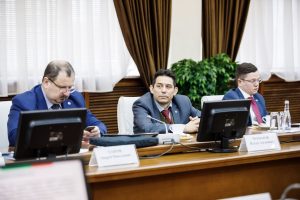
Also from the Institute of Geology and Petroleum Technologies, the meeting was attended by Deputy Director of IGPT for Marketing, Director of Center for Advanced Training, Quality Management and Marketing (CdoGEO) Ildus Chukmarov, Deputy Director of IGPT for Innovation Vladislav Sudakov, Head of the Department of Hard-To-Recover Hydrocarbons Development and Operation Mikhail Varfolomeev.
Welcoming the participants of the meeting, Rustam Minnikhanov noted that the key task of the Supervisory Board is a comprehensive analysis and assistance in the implementation of the program for the creation and development of the WCSC.
“The center is working on the creation of effective technologies for forecasting, prospecting, exploration and development of hydrocarbon deposits, designed to provide the country with affordable oil and gas reserves, as well as technologies for their environmentally friendly and economical production,” the President of the Republic of Tatarstan recalled, emphasizing that the center’s activities are important for scientific and technological development and economic security of the country.
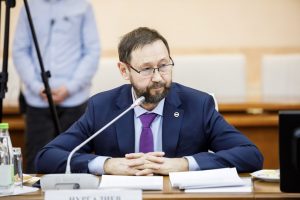
Danis Nurgaliev, Vice-Rector for Petroleum Technologies, Environmental Management and Earth Science at KFU, made a report on the work carried out during the year.
He noted that all indicators of the WCSC were fully met, and more than 60% of the indicators (in terms of the number of leading scientists, published articles in high-ranking journals, attracting extrabudgetary funding, the number of patents filed and received) were overfulfilled by more than 1.5 times.
According to the vice-rector of KFU, at present, the demand for fossil energy sources has increased, including coal. At the same time, the maximum demand for oil and gas, in terms of optimistic models of carbon emissions into the atmosphere, will be reached no earlier than 2035-2040. Nevertheless, the extraction and use of oil and gas for Russia and the whole world will be relevant for many decades, despite the current trends in obtaining new energy, including the production of hydrogen using electricity.
“In 2022, about 43% of the country’s budget revenues are oil and gas revenues. And providing the country with sufficient reserves of affordable oil, as well as its production at a competitive cost and as environmentally friendly as possible, are the most important challenges today. Every year, the structure of reserves is deteriorating, and most new deposits require large investments. This determined the strategy of our center,” said Nurgaliev.
Danis Nurgaliev spoke in detail about the main areas of research and development in the current year. In particular, about technologies in the field of development of extra-viscous oil by means of thermal methods, forecasting of hydrocarbon reserves in large areas, express evaluation of licensed areas, express methods for prospecting, exploration and evaluation of reserves in “old” fields, technologies for underground oil refining using nanoscale catalytic systems and a whole range of technologies for the development of giant oilfields at a late stage.
One of the important areas of work of the WCSC is research and development in the field of hydraulic fracturing. Significant progress has been made in terms of creating new import-substituting compounds for acid treatment of carbonate reservoirs, where a significant part of oil reserves is concentrated.
At the same time, a series of programs was developed based on the use of end-to-end technologies (Industrial Internet, Big Data, Deep Learning) that help to systematize and simplify many routine processes important for optimizing oil production.
“We are developing with our partners – oil and gas and service companies,” said Danis Nurgaliev. — Everything that we develop, we test and put into practice together with them. It should be noted that we carry out a significant part of the developments with Tatneft and small oil companies. The list of our partners includes all the largest enterprises of the Russian Federation, Cuba, China, Vietnam, India, Kuwait, Oman and other countries.”
He also added that the WCSC consortium provides half of the annual graduates of oil and gas specialists in Russia and contributes to the professional development of more than 5,000 specialists from Russian and foreign oil and gas and service companies.
“On a global scale, the WCSC consortium is the undoubted leader in the field of studying the development of giant oil fields, as well as in the field of “underground oil refining” – unconventional oil production using thermal methods and catalytic systems. All this allowed us to become one of the 75 best universities in the world in Petroleum Engineering according to the QS international rating agency.”
President of the Middle East Technical University (Turkey) Mustafa Versan Kok, who took part in the online meeting, stressed that KFU occupies a high position in the world university rankings.
“KFU participates in strategic projects, its scientists and staff conduct significant research and publish articles in international scientific journals that contribute to an increase in oil production,” said Mustafa Versan Kok. He also stressed that Kazan annually hosts international oil and gas conferences, one of which is Thermal Methods for Enhanced Oil Recovery: Laboratory Testing, Simulation and Oilfields (ThEOR). In 2022, it was held in Baku (Azerbaijan), and in 2023 it will be held in Ankara (Turkey) at the site of the Middle East Technical University.
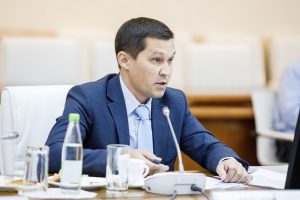
Every year, changes are made to the WCSC development program in order to update and specify the stated obligations, taking into account global trends, the development of scientific research areas and the needs of enterprises. Vladislav Sudakov, Deputy Director for Innovation Activities of IGPT KFU, reported on the changes made.
The President of Tatarstan focused on the need to intensify work to synchronize profile institutions with PJSC Tatneft. Rustam Minnikhanov proposed to actively use the resources of the republic’s largest oil company, which is currently forming a powerful laboratory base.
Photo by: Ksenia Bogdanova

